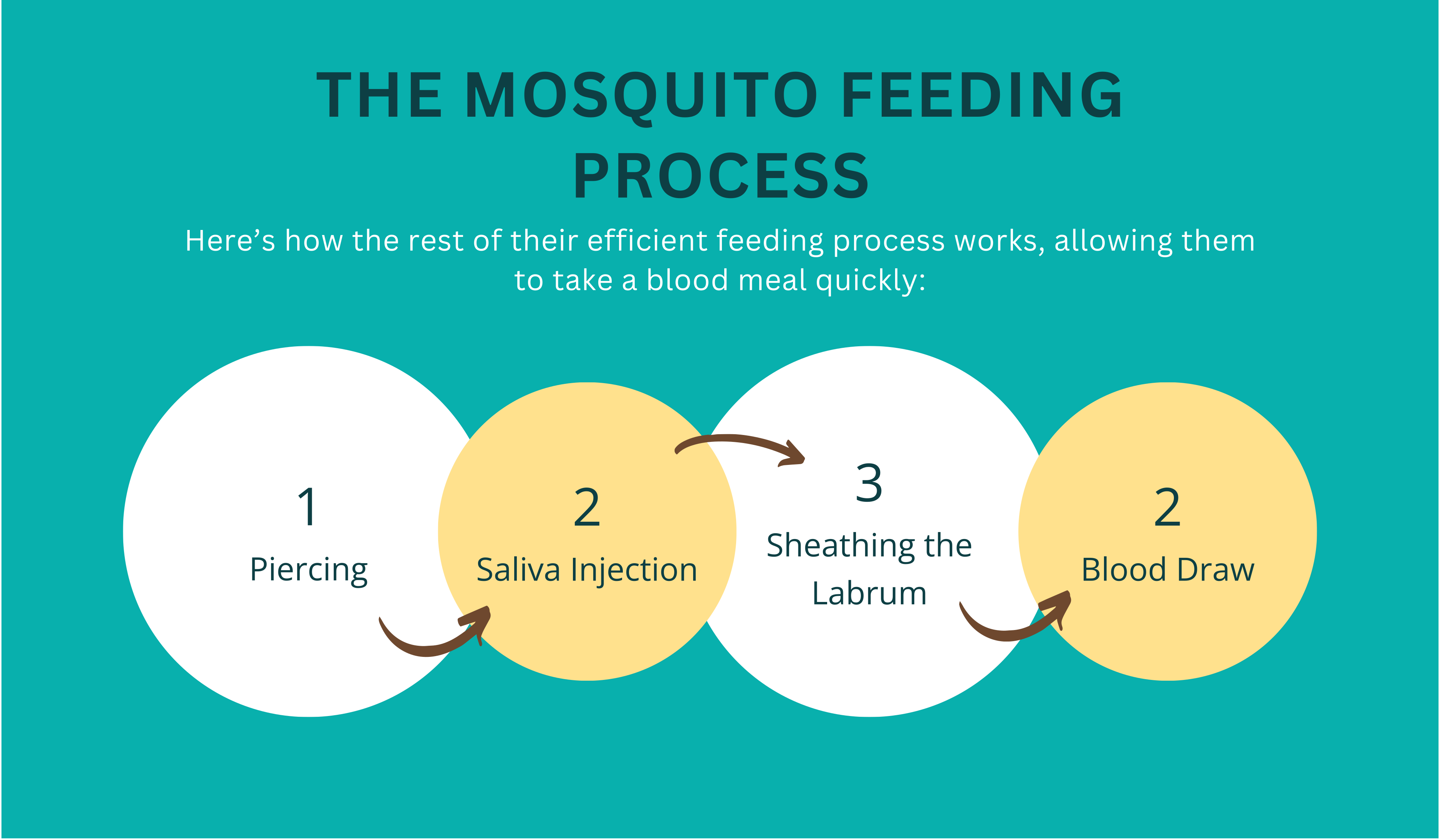How Do Mosquitoes Bite and Why Do They Itch So Much?
Ever wondered how mosquitoes manage to bite through your skin without you noticing immediately?
Mosquitoes use a specialized mouthpart called a proboscis to pierce the skin and locate blood vessels. This proboscis is incredibly efficient at finding the right spot to draw blood while injecting saliva that prevents clotting.
If you're curious about the science behind these pesky bites and how mosquitoes have evolved such an efficient method, keep reading.
Key Takeaways
- Female mosquitoes use specialized mouthparts called proboscis, which contain needle-like structures, to pierce the skin and draw blood for egg development.
- Mosquito bites inject saliva containing anticoagulants, triggering an immune response that causes itching, redness, and swelling.
- Simple methods, such as applying ice packs, calamine lotion, or over-the-counter remedies, can immediately relieve mosquito bites.
- Preventing mosquito bites involves staying indoors during peak hours, using repellents, wearing protective clothing, and eliminating standing water around living spaces.
How Mosquitoes Draw Your Blood
Mosquito species have evolved specialized tools for feeding on human blood. Their needle-like mouthparts pierce the skin and locate blood vessels, enabling them to draw blood efficiently.
Mouthparts Designed for Piercing
Mosquitoes, specifically female mosquitoes for egg development, have developed intricate mouthparts known as proboscis. This proboscis comprises several needle-like structures that work together to make feeding possible.
Note that male mosquitoes lack these specialized structures and do not feed on blood. They rely solely on plant nectar and other sugary plant fluids for their lifespan.
The Feeding Process

Once a mosquito lands on the human skin, it uses sensory cues like carbon dioxide, body heat, and body odor to find an optimal feeding site. Its antennae have receptors to help detect these signals.
Here’s how the rest of their efficient feeding process works, allowing them to take a blood meal quickly:
Piercing: They use their mandibles and maxillae (saw-like mouthparts) to saw through the skin.
Saliva Injection: The hypopharynx injects saliva containing anticoagulants to prevent blood clotting at the bite site.
Sheathing the Labrum: The mosquito sheaths its labrum (straw-like part) to create a clear channel for blood to flow. The mandibles and maxillae retract during this step.
Blood Draw: Blood is drawn up through the labrum into the mosquito's abdomen.
Why Are Mosquito Bites So Itchy?
Unlike other bug bites, mosquito bites can cause intense itching and discomfort, making them a common nuisance for those outdoors.
When a mosquito bites, it injects saliva into the skin, which contains proteins to prevent blood clotting. This introduction triggers the immune system to respond.
The body's defense mechanism releases histamine. This reaction results in the following:
Body’s Reaction | Details |
Itching | The primary symptom caused by histamine release. |
Redness and Swelling | Due to increased blood flow and immune cell activity. |
Hives | In some cases, larger welts can form. |
How to Calm the Itch
When a mosquito bite begins to itch, quick actions can help manage the discomfort. To manage the itching right away, consider these steps:
Ice Pack: Wrap in a cloth and apply for 10-15 minutes.
Cold Water: Rinse the bite area to soothe it.
Calamine Lotion: Provides a cooling effect and relieves itching.
Over-the-Counter Remedies
Over-the-counter solutions offer convenience and effectiveness. Essential products include:
Products | Benefit |
Antihistamine Cream | Reduces itching and swelling |
Hydrocortisone Cream | Decreases inflammation |
Oral Antihistamines | Alleviates systemic reactions |
Home Remedies
Many prefer natural solutions available at home. Effective home remedies include:
- Aloe Vera: Apply directly to the bite area.
- Baking Soda Paste: Mix with water and apply for relief.
- Honey: Dab a small amount on the bite.
- Oatmeal Bath: An oatmeal bath can soothe the skin for multiple bites.
How to Prevent Mosquito Bites
Reducing the risk of infected mosquito bites involves simple yet effective strategies. These methods can help mitigate the spread of mosquito-borne diseases like encephalitis, Dengue fever, Zika virus, Yellow fever, Chikungunya, and West Nile virus.
Stay Indoors During Peak Hours
Mosquitoes are most active during dawn and dusk. They will likely be out searching for food, and heeding this can significantly decrease mosquito exposure.
To maximize protection, recognize the peak hours and plan outdoor activities accordingly. Here are specific times and additional tips:
- Dawn: 5:00 AM - 7:00 AM
- Dusk: 5:00 PM - 7:00 PM
Use Mosquito Repellents
Insect repellents can offer a reliable barrier against mosquito bites by making the skin less appealing to these pests. So, choosing effective products and following label instructions for mosquito control is crucial.
Wear Protective Clothing
Appropriate clothing can provide a physical barrier against mosquito bites. Since certain types of clothing are more effective in preventing bites, consider these choices for better protection:
- Long Sleeves and Pants: Cover as much skin as possible
- Loose-Fitting Clothes: Tighter clothes can be penetrated more easily
- Light-Colored Fabrics: Mosquitoes are less attracted to these
Secure Your Environment
Making your living environment less hospitable to mosquitoes can drastically reduce their presence. Steps that help secure your environment include:
- Remove Standing Water
- Install Screens
- Use Mosquito Nets
- Maintain Yard
When to Call in the Professionals
If you notice an unusual number of mosquito bites despite using repellents and keeping the doors and windows shut, it's time to call a professional pest control company (like us at Native Pest Management).
With our help, you can save time and reduce the risk of vector diseases transmitted by Anopheles mosquitoes, such as malaria. Contacting us can be the best action for long-lasting relief and peace of mind.
